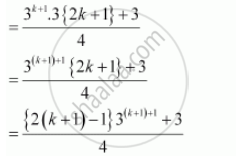Advertisements
Advertisements
Question
Prove the following by using the principle of mathematical induction for all n ∈ N:
Solution
Let the given statement be P(n), i.e.,


Thus, P(k + 1) is true whenever P(k) is true.
Hence, by the principle of mathematical induction, statement P(n) is true for all natural numbers i.e., n.
APPEARS IN
RELATED QUESTIONS
Prove the following by using the principle of mathematical induction for all n ∈ N:
Prove the following by using the principle of mathematical induction for all n ∈ N:
Prove the following by using the principle of mathematical induction for all n ∈ N:
`1/1.4 + 1/4.7 + 1/7.10 + ... + 1/((3n - 2)(3n + 1)) = n/((3n + 1))`
If P (n) is the statement "n(n + 1) is even", then what is P(3)?
If P (n) is the statement "2n ≥ 3n" and if P (r) is true, prove that P (r + 1) is true.
1 + 3 + 5 + ... + (2n − 1) = n2 i.e., the sum of first n odd natural numbers is n2.
12 + 32 + 52 + ... + (2n − 1)2 = \[\frac{1}{3}n(4 n^2 - 1)\]
a + (a + d) + (a + 2d) + ... (a + (n − 1) d) = \[\frac{n}{2}\left[ 2a + (n - 1)d \right]\]
52n −1 is divisible by 24 for all n ∈ N.
32n+7 is divisible by 8 for all n ∈ N.
52n+2 −24n −25 is divisible by 576 for all n ∈ N.
2.7n + 3.5n − 5 is divisible by 24 for all n ∈ N.
\[\text{ Let } P\left( n \right) \text{ be the statement } : 2^n \geq 3n . \text{ If } P\left( r \right) \text{ is true, then show that } P\left( r + 1 \right) \text{ is true . Do you conclude that } P\left( n \right)\text{ is true for all n } \in N?\]
Prove that the number of subsets of a set containing n distinct elements is 2n, for all n \[\in\] N .
\[\text { A sequence } x_1 , x_2 , x_3 , . . . \text{ is defined by letting } x_1 = 2 \text{ and } x_k = \frac{x_{k - 1}}{k} \text{ for all natural numbers } k, k \geq 2 . \text{ Show that } x_n = \frac{2}{n!} \text{ for all } n \in N .\]
\[\text{ The distributive law from algebra states that for all real numbers} c, a_1 \text{ and } a_2 , \text{ we have } c\left( a_1 + a_2 \right) = c a_1 + c a_2 . \]
\[\text{ Use this law and mathematical induction to prove that, for all natural numbers, } n \geq 2, if c, a_1 , a_2 , . . . , a_n \text{ are any real numbers, then } \]
\[c\left( a_1 + a_2 + . . . + a_n \right) = c a_1 + c a_2 + . . . + c a_n\]
Prove by method of induction, for all n ∈ N:
3n − 2n − 1 is divisible by 4
Prove by method of induction, for all n ∈ N:
5 + 52 + 53 + .... + 5n = `5/4(5^"n" - 1)`
Answer the following:
Prove, by method of induction, for all n ∈ N
2 + 3.2 + 4.22 + ... + (n + 1)2n–1 = n.2n
Answer the following:
Prove, by method of induction, for all n ∈ N
`1/(3.4.5) + 2/(4.5.6) + 3/(5.6.7) + ... + "n"/(("n" + 2)("n" + 3)("n" + 4)) = ("n"("n" + 1))/(6("n" + 3)("n" + 4))`
Answer the following:
Prove by method of induction
`[(3, -4),(1, -1)]^"n" = [(2"n" + 1, -4"n"),("n", -2"n" + 1)], ∀ "n" ∈ "N"`
Answer the following:
Prove by method of induction 152n–1 + 1 is divisible by 16, for all n ∈ N.
Prove statement by using the Principle of Mathematical Induction for all n ∈ N, that:
1 + 3 + 5 + ... + (2n – 1) = n2
Give an example of a statement P(n) which is true for all n ≥ 4 but P(1), P(2) and P(3) are not true. Justify your answer
Give an example of a statement P(n) which is true for all n. Justify your answer.
Prove the statement by using the Principle of Mathematical Induction:
32n – 1 is divisible by 8, for all natural numbers n.
Prove the statement by using the Principle of Mathematical Induction:
n3 – n is divisible by 6, for each natural number n ≥ 2.
Prove the statement by using the Principle of Mathematical Induction:
n(n2 + 5) is divisible by 6, for each natural number n.
Prove the statement by using the Principle of Mathematical Induction:
`sqrt(n) < 1/sqrt(1) + 1/sqrt(2) + ... + 1/sqrt(n)`, for all natural numbers n ≥ 2.
Prove the statement by using the Principle of Mathematical Induction:
1 + 2 + 22 + ... + 2n = 2n+1 – 1 for all natural numbers n.
Prove the statement by using the Principle of Mathematical Induction:
1 + 5 + 9 + ... + (4n – 3) = n(2n – 1) for all natural numbers n.
Show that `n^5/5 + n^3/3 + (7n)/15` is a natural number for all n ∈ N.
If P(n): 2n < n!, n ∈ N, then P(n) is true for all n ≥ ______.
Consider the statement: “P(n) : n2 – n + 41 is prime." Then which one of the following is true?
By using principle of mathematical induction for every natural number, (ab)n = ______.
